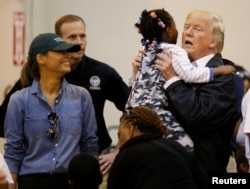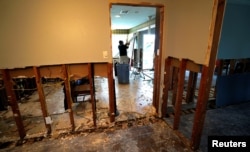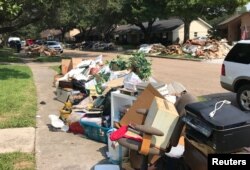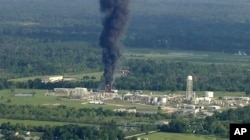U.S. President Donald Trump spent a day visiting with hurricane victims, ending it with a short stop in Lake Charles, Louisiana, where he shook hands and posed for photographs with emergency response teams.
Trump made no public remarks during his short stop in Louisiana, but he met with storm victims and promised a speedy recovery from the ravages of Hurricane Harvey.
Harvey made landfall in Texas last weekend, devastating coastal communities and pouring record-setting amounts of rain on much of southeastern Texas and the neighboring state of Louisiana. On Saturday, Texas officials said the death toll from the storm had risen to 44.
'We have a long way to go'
Earlier Saturday, Trump spoke to a crowd of survivors in Houston at the First Church of Pearland.
“We have a long way to go, but the water is disappearing,” Trump said.
“You look at the neighborhoods,” he continued. “Even yesterday they had water and today it’s all swept up and cleaned up. ... You got a lot of hardworking people, I’ll tell you that.”
The president was making his second visit to Texas in the space of a week, to show support for Texans coping with the massive flooding in the city of Houston. First lady Melania Trump accompanied him on the visit.
The Trumps visited the NRG Center, a shelter in Houston, where the first lady spend some of her time at the shelter’s “Kids Zone” donating books, crayons and games for the children.
The Trumps also visited a distribution center at the First Church of Pearland, where the first lady donated diapers, one of the items most requested from the church.
President Trump met with residents and volunteers, something he did not do during his initial visit to the area Tuesday, when he focused exclusively on the government’s response to the storm and drew criticism for not showing more empathy in a crisis situation.
Also Saturday, the president increased the amount of federal aid contributed to cost-sharing for cleanup efforts, from 75 percent to 90 percent federal support for debris removal. The White House said in a statement that 100 percent of expenses for emergency protective measures will be covered by federal assistance.
Trump’s request to Congress, considered just an initial Harvey relief package, includes $7.4 billion for the Federal Emergency Management Agency’s (FEMA) rapidly dwindling disaster aid fund for things like home repairs and $450 million for disaster loans to small-business owners. Congress is expected to swiftly approve the request.
Nearly 450,000 households in the region have registered for FEMA aid, according to the White House.
Search and rescue
Rescuers continued their search Saturday for survivors in Texas eight days after Harvey began sweeping through the region. Houston Mayor Turner warned some residents their homes may not dry out for weeks.
The storm has displaced more than 1 million people.
As floodwaters began to recede, some Texans began returning to their homes to begin the sobering task of assessing the damage inflicted by Harvey.
However, Turner called for more evacuations in western neighborhoods of the city that are near two overflowing reservoirs. The Army Corps of Engineers continues to intentionally flood those areas to prevent dam and levee failures. Turner said up to 20,000 homes will remain flooded for another two weeks.
Houston-area officials said Friday that 156,000 homes have been damaged in Harris County, which includes Houston, the country’s fourth most populous city.
Immigrants
In Harris County, which includes Houston, residents contemplated the daunting task of rebuilding their lives, with one group of people grappling with a special set of concerns. Immigrants who are in the country illegally are afraid that if they apply for help they will be arrested. Outreach workers have been deployed to reassure them that they will not be detained when they seek help.
Houston Mayor Turner had said earlier in the week he would personally represent anyone arrested on immigration violations after seeking help
Cesar Espinosa, executive director of Immigrant Families and Students in the Struggle, said Turner’s statement was a “big deal” for immigrants. “When they hear it from an official, they say, ‘OK, now we believe it,’” he added.
Immigration and Customs Enforcement has said it is “not conducting immigration enforcement operations in the affected area.”
Refineries
The storm shut about a fourth of U.S. refinery capacity, much of which is located along the Gulf Coast, and caused gasoline prices to spike ahead of the Labor Day holiday weekend.
Several refineries on the East Coast have run out of gasoline, raising fears that travelers will face fuel shortages during the three-day holiday weekend.
Concerns over supplies have led to the U.S. Energy Department authorizing the release of up to 4.5 million barrels of oil from the Strategic Petroleum Reserve.
WATCH: VOA's Celia Mendoze talks risky rescue with Texas National Guard pilot













